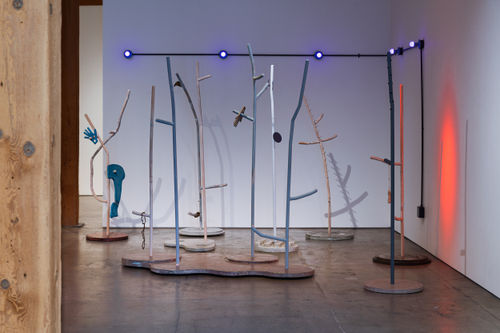Elizabeth Leach Gallery is proud to present Grief is on my calendar every day at 2:00 p.m., a solo exhibition of works by Derek Franklin.
Any exhibition space is a stage of sorts on which objects are arranged and lit in a specific manner that supports and structures of the player’s movements to produce effect. On the stage of the commercial gallery, experience happens, knowledge is produced, commerce is transacted. Derek Franklin uses the figure of the stage as a way to think about the historical material conditions that structure everyday life, imagining every person as a player with a role into which they are born and whose actions are constrained by the script.
He produces paintings and sculptures that depict or evoke the actions performed on the most quotidian stage, that of the household, actions that moment by moment move the plot forward. In the theater of the everyday, another word for this plot movement is survival. What does one do to cope with violence that is both overt and invisibly woven into the structures of society? Franklin focuses on specific actions: the daily rituals of care that may include food and drink or the arrangement of flowers plucked from the garden.
In Franklin’s layered paintings, the aperture of the spotlight framing the vase or plate punctures the surface of both painting and the remains of the performance it depicts, revealing it as performance. But the images simultaneously reflect Franklin’s respect and affection for the objects that he sees as being imbued with the stories of the people who live with them. He sees these not as interchangeable props, but specific objects that bear witness to the lives of their owners.
The forms of Franklin’s sculptures evoke both prop and player: distorted wooden coatrack and stick-figure human. They support hints of odd and barely recognizable detritus of the everyday. And they formally insist that perceptions of their precarity are overstated, mightily grounded as they are, supported by concrete cast forms.
In these objects and images, what may pass for reality is estranged and mediated, revealing it as a social construct. Herein lies their power.


